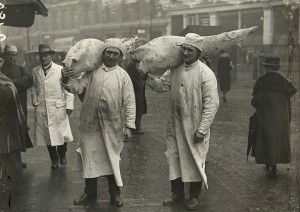 I am blessed with two fathers: a biological father who decided to resign from his paternal post when I was eleven and have no further contact with me, and a stepfather who has always been physically there but struggles with emotional attunement. Two Mu-fathers in other words. Do I really need a third?
I am blessed with two fathers: a biological father who decided to resign from his paternal post when I was eleven and have no further contact with me, and a stepfather who has always been physically there but struggles with emotional attunement. Two Mu-fathers in other words. Do I really need a third?
“If you wish to realize Mu, you have to sit with a sangha”. There’s the throwdown line.
Sangha (Pali, Sanskrit) with meanings varying from “association”, “assembly,” “company” or “community”. Most commonly referring to the monastic community of ordained Buddhist monks or nuns, although used now by Buddhists of all stripes to describe any kind of Buddhist assembly: from sitting groups to “Spiritual Singles”.
Mu can’t be realized alone says Master G, nor in an I-Thou dyad with him but only through sangha. Mu for Girasole is about family, community, about tribalism. If you want realization of Mu through a therapeutic relationship with me, your dog, or via a soul-searching lone-wolf path, you won’t get there. Mi dispiace.
It’s a very Italian take on the matter. Italians are not big on dyads other than Madonna and child, or the twosome of lovers. Wander around any small Italian town on a sunny afternoon, and friends are predominantly to be witnessed in groups. The more the merrier is the social setting as captured by a phrase that one hears repeated again and again with almost religious fervour whilst living in Italy “il piacere di stare insieme”. “Being together” is enough to account for going out. No other motive require. It’s quite canid you might say, a rewriting of a more anglo notion of two’s company, and three’s a crowd. For them, three or more is company, two is a lonelier number.
“Italians seem less likely than some other European peoples to shed friends as they get older, and practices of shoring up friendship by converting them into bonds of unbreakable ritual kinship (comparaggio) is common,” writes David Moss in The Encyclopedia of Contemporary Italian Culture. Charles Killinger describes Italian leisure time as predominantly a “culture of conversation”, a culture that values and applauds qualities of extraversion, helped along by a climate that has encouraged gathering in public places since Roman times. Sociologist William Corsaro, studying the peer routines of nursery school children in Italy and America notes how even Italian infants are less protective of their “interactive spaces” than American children: the more the merrier already a ruling ethos for the Italian tots, whereas in American nursery schools, the idea of keeping a game or space private, exclusive, factors into the discussion much more strongly.
 And yet if we turn to the enlightenment of the first Michele, not Michele Bodaishin Girasole, but Michele Siddhārtha Gautama (aka The Buddha – the name itself means “The Realized” one, or Awakened One), his realization did not occur in the midst of a sangha. Rather the grounds for his realization came about after having been the beneficiary of a one-on-one act of kindness a village girl named Sujata who took pity on him in his emaciated state and offered him some rice pudding. And then, later, sitting alone, wrestling with his own Mu Shit for the next 49 days, the mush of his mind, mythologically represented by the demon Mara. Vowing not to get up until he’d made sense of it all, until he had had “complete insight into the cause of suffering, and the steps necessary to eliminate it”. Only then did he go out and start a meditation Meetup Group.
And yet if we turn to the enlightenment of the first Michele, not Michele Bodaishin Girasole, but Michele Siddhārtha Gautama (aka The Buddha – the name itself means “The Realized” one, or Awakened One), his realization did not occur in the midst of a sangha. Rather the grounds for his realization came about after having been the beneficiary of a one-on-one act of kindness a village girl named Sujata who took pity on him in his emaciated state and offered him some rice pudding. And then, later, sitting alone, wrestling with his own Mu Shit for the next 49 days, the mush of his mind, mythologically represented by the demon Mara. Vowing not to get up until he’d made sense of it all, until he had had “complete insight into the cause of suffering, and the steps necessary to eliminate it”. Only then did he go out and start a meditation Meetup Group.
But of course I would say this, not wanting to give up my lone wolf status, but still hoping I might not be entirely shunned. Tables-turned, metaphors revised (I don’t buy into the diamond) Michele’s arguments are all those I might use with a lone-wolf client wanting the fruits of social interaction but unwilling to tolerate some of the discomforts of the social interaction he craves. If this were a different book, maybe I would find a way to fly out once a month to Rome (though what to do with Max?) in order to sit at the feet of the Master. I’m sure it would make for a better read, but as I am not sure this will be read by anyone anyway, do I want to do it just for the injection of drama?
Michele has already given me what I need from him: a Mu.
This is the role of the Zen guru, a masterful tor/mentor for his disciple, unerringly able to pinpoint (in our modern parlance, we might say “diagnose”) the blockages or hindrances getting in the way of the disciple’s enlightenment (our modern term for this might be “well-being” or is that too tame a transposition?). The koan is designed to nudge, though more often than not shake the disciple out of whatever ails him.